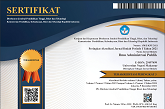Implementation of the Non-Cash Food Assistance Program (BPNT) in Takalar Regency
(1) Graduate Program in Public Administration, Faculty of social and political sciences, Universitas Padjadjaran, Bandung, Indonesia, 40135
(2) Center for Decentralization and Participatory Development Research, Faculty of social and political sciences, Universitas Padjadjaran, Bandung, Indonesia, 40135
(3) Center for Decentralization and Participatory Development Research, Faculty of social and political sciences, Universitas Padjadjaran, Bandung, Indonesia, 40135
(*) Corresponding Author
DOI: https://doi.org/10.26858/jiap.v13i1.47257
Abstract
Poverty alleviation is one of the efforts to improve the welfare of society. The resulting impact can affect life and the fulfillment of basic needs of society such as food needs. This study aims to analyze the implementation of the non-cash food assistance program in Takalar Regency. The method used in this research is qualitative-explorative to examine the implementation of the non-cash food assistance program as a national initiative to fight poverty. Data was collected from interviews, field observations and existing literature, then Nvivo 12 Pro was used to analyze the results. The location in this study is in Takalar Regency. The research results show that the implementation of the non-cash food assistance program has gone well, such as access to information. However, the findings in this study that were considered less than optimal were related to executor accountability, timeliness, suitability for needs, not on target, and target group coverage.
Keywords
Full Text:
PDFReferences
Bahri, M. (2020). Dampak COVID-19 terhadap Kemiskinan dan Pengangguran Indonesia. Preprints.org. 2020080288. https://doi.org/10.20944/preprints202008.0288.v1
Fauzia, M. (2021). Penduduk Miskin Indonesia Naik Jadi 27,55 Juta akibat Covid-19, Tren Penurunan Kemiskinan. kompas.com. https://money.kompas.com/read/2021/02/16/073400926/penduduk-miskin-indonesia-naik-jadi-27-55-juta-akibat-covid-19-tren-penurunan?page=all
Gassner, A., Harris, D., Mausch, K., Terheggen, A., Lopes, C., Finlayson, R. F., & Dobie, P. (2019). Poverty eradication and food security through agriculture in Africa: Rethinking objectives and entry points. Outlook on Agriculture, 48(4), 309–315. https://doi.org/10.1177/0030727019888513
Gómez Martín, E., Giordano, R., Pagano, A., van der Keur, P., & Máñez Costa, M. (2020). Using a system thinking approach to assess the contribution of nature based solutions to sustainable development goals. Science of The Total Environment, 738, 139693. https://doi.org/10.1016/j.scitotenv.2020.139693
Huda, S., & Yuliati, A. (2022). Analysis of The Influence of Minimum Wage and Human Development Index On Unemployment Rate In Indonesia]. Devotion Journal of Community Service, 3(13), 2171–2176. https://doi.org/10.36418/dev.v3i13.271
Ishartono, O. :, Santoso, &, & Raharjo, T. (2016). Sustainable Development Goals (SDGS)Dan Pengentasan Kemiskinan. Social Work Journal, 6(2), 154–272. https://doi.org/https://doi.org/10.24198/share.v6i2.13198
Manaf, N. A., & Ibrahim, K. (2017). Poverty Reduction for Sustainable Development: Malaysia’s Evidence-Based Solutions. Global Journal of Social Sciences Studies, 3(1), 29–42. https://doi.org/10.20448/807.3.1.29.42
Molyneux, D. H. (2008). Combating the “other diseases” of MDG 6: changing the paradigm to achieve equity and poverty reduction? Transactions of the Royal Society of Tropical Medicine and Hygiene, 102(6), 509–519. https://doi.org/10.1016/j.trstmh.2008.02.024
Pollard, C. M., & Booth, S. (2019). Food Insecurity and Hunger in Rich Countries—It Is Time for Action against Inequality. International Journal of Environmental Research and Public Health, 16(10), 1804. https://doi.org/10.3390/ijerph16101804
Putera, P. B., Widianingsih, I., Ningrum, S., Suryanto, S., & Rianto, Y. (2022). Overcoming the COVID-19 Pandemic in Indonesia: A Science, technology, and innovation (STI) policy perspective. Health Policy and Technology, 11(3), 100650. https://doi.org/10.1016/j.hlpt.2022.100650
Radosavljevic, S., Haider, L. J., Lade, S. J., & Schlüter, M. (2021). Implications of poverty traps across levels. World Development, 144, 105437. https://doi.org/10.1016/j.worlddev.2021.105437
Siagian, E. S. (2017). Public-private partnerships in Indonesia: a comprehensive legal framework of significance to action and analysis. Asia Pacific Journal of Public Administration, 39(1), 72–78. https://doi.org/10.1080/0142159X.2017.1294395
Siagian, S. E., Sumaryana, A., Widianingsih, I., Nurasa, H., & Mantalia, S. S. (2018). A Study of the Implementation of Indonesian Public Private Partnership Procurement Regulation. In Global Encyclopedia of Public Administration, Public Policy, and Governance (hal. 1–9). Springer International Publishing. https://doi.org/10.1007/978-3-319-31816-5_1208-1
Singh, H. P., Singh, A., Alam, F., & Agrawal, V. (2022). Impact of Sustainable Development Goals on Economic Growth in Saudi Arabia: Role of Education and Training. Sustainability, 14(21), 14119. https://doi.org/10.3390/su142114119
Sondang Siagian, E., Sumaryana, A., Widianingsih, I., & Nurasa, H. (2019). Public-private partnerships in solid waste management in Indonesia: the need for technical regulation. Asia Pacific Journal of Public Administration, 41(4), 246–250. https://doi.org/10.1080/23276665.2019.1694236
Suhendar, A. (2020). Keterbukaan Informasi Publik Bentuk Keseriusan Pemerintah Menuju Good Governance (Implementasi Undang Undang Nomor 14 Tahun 2008). Jurnal Wacana Kinerja: Kajian Praktis-Akademis Kinerja dan Administrasi Pelayanan Publik, 13(2), 243–251.
sulsel.bps.go.id. (2023). Jumlah Penduduk Menurut Kabupaten/Kota (Jiwa), 2021-2023. https://sulsel.bps.go.id/indicator/12/83/1/jumlah-penduduk-menurut-kabupaten-kota.html
Widianingsih, I., & Morrell, E. (2007). Participatory Planning In Indonesia. Policy Studies, 28(1), 1–15. https://doi.org/10.1080/01442870601121320
Woolf, N. H., & Silver, C. (2018). Qualitative Analysis Using Nvivo, The Five Level QDA Method. In Routledge. New York and London: Routledge.
Article Metrics
Abstract view : 166 times | PDF view : 27 timesRefbacks
Copyright (c) 2023 Rusliadi Rusliadi, Ida Widianingsih, Rd Achmad Buchari

This work is licensed under a Creative Commons Attribution 4.0 International License.
Diterbitkan oleh:
Program Studi Ilmu Administrasi Publik
Program Pascasarjana Universitas Negeri Makassar
JIAP Index By:

This work is licensed under a Creative Commons Attribution 4.0 International License.









